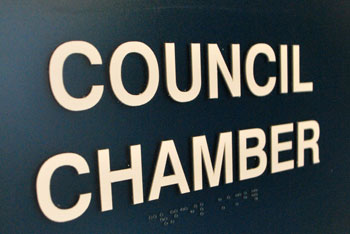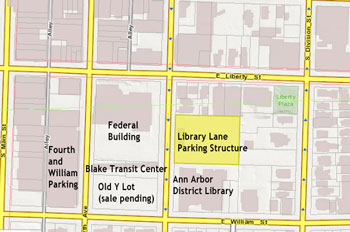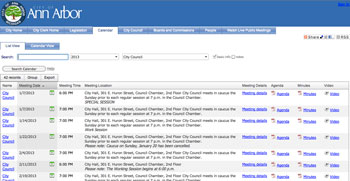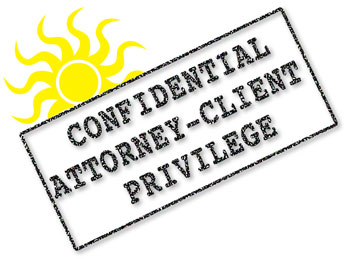Editor’s note: This “Live Updates” coverage of the Ann Arbor city council’s March 17, 2014 meeting includes all the material from an earlier preview article published last week. The intent is to facilitate easier navigation from the live updates section to background material already in this file.
The Ann Arbor city council’s March 17, 2014 meeting features an agenda with one significant item held over from the March 3 meeting: a resolution that reserves a portion of the surface of the Library Lane underground parking structure in downtown Ann Arbor for an urban park that would remain publicly owned.

The sign on the door to the Ann Arbor city council chamber, installed in the summer of 2013, includes Braille.
But related to that item is a new resolution that directs the city administrator to move toward listing for sale the development rights for the top of the parking structure. The urban park designation was postponed from the March 3, 2014 meeting in part to synch up its timing with this resolution, which is being brought forward by Stephen Kunselman (Ward 3).
An additional related item is a resolution that would waive the attorney-client privilege on a document prepared by Dykema Gossett, the city’s outside bond counsel. The Build America Bonds used to finance construction of the Library Lane structure have private-use limitations on facilities constructed with financing from such bonds. The Dykema memo analyzes those limitations with respect to Library Lane.
That’s one of two separate resolutions on the waiver of attorney-client privilege. The other one, postponed from the council’s March 3 meeting, would waive privilege on a city attorney memo dated Feb. 25, 2014 on the topic of how appeals to property assessments work. The memo apparently helps explain “… the effect of a reduction of the assessment for one year by the Board of Review and/or the Michigan Tax Tribunal on the property tax assessment for the subsequent year.” The council’s agenda also includes an attachment of a report sent to the state tax commission, explaining how the city has complied with various deficiencies in documentation identified previously by the commission.
The council will be considering two items related to energy issues. First, the council will consider a resolution that directs the city’s energy commission and staff to convene a stakeholder work group, with the support of the city attorney’s office, to draft a commercial building energy benchmarking and disclosure ordinance. It’s an effort to help achieve goals in the city’s climate action plan.
The second energy-related item is a resolution that would direct the city administrator to hire an additional staff member for the city’s energy office, bringing the total back to two people, according to the resolution. The energy office staffer would “create and implement additional community energy efficiency, conservation, and renewable energy programs that further the Climate Action Plan’s adopted targets.”
After approving the purchase of 18 replacement vehicles on March 3 and several pieces of basic equipment at its Feb. 18 meeting, the council will be considering three resolutions that involve additional vehicles and equipment: two forklifts for the city’s materials recovery facility, a Chevrolet Impala for use by police detectives, and a lease for golf carts from Pifer Inc.
The 15th District Court, which is the responsibility of the city of Ann Arbor, is featured in two agenda items. The council will be asked to approve a $160,000 contract with the Washtenaw County sheriff’s office for weapons screening services for the 15th District Court, which is housed at the Justice Center – the police/courts building immediately adjoining city hall at the northeast corner of Huron and Fifth.
A second item related to the court is an introduction of Shryl Samborn as the new administrator of the 15th District Court. Samborn is currently deputy administrator. Current administrator Keith Zeisloft is retiring. His last day of work is March 28.
At its March 17 meeting, the council will also be asked to approve the temporary relocation of Precinct 1-7 from Pierpont Commons, 2101 Bonisteel, to Northwood Community Center (family housing). That relocation will be in effect for the May 6 vote on the transit millage and for the Aug. 5 primary elections.
Among the items attached to the March 17 agenda as reports or communications is one from the city administrator noting that for the April 5 Hash Bash event on the University of Michigan campus, all sidewalk occupancy permits and peddler’s licenses in the immediately surrounding area will be suspended. The possibility of such suspension – which the city administrator’s memo indicates is motivated by a desire to relieve congestion – is part of the terms and conditions of such licenses. They’ve been suspended for Hash Bash for at least the last six years, according to the memo.
Also among the attachments are the Ann Arbor Downtown Development Authority’s annual reports for 2004, 2005, 2006 and 2007. Those reports have been the subject of back-and-forth between Stephen Kunselman (Ward 3) and The Ann Arbor Observer over a report in The Observer’s December edition. A follow-up to an initial correction by The Observer is anticipated in the April edition – establishing that Kunselman’s contention had been correct: The DDA annual reports had not been filed with the governing body as required.
The consent agenda also includes approval of street closings for seven upcoming events: a soap box derby, SpringFest, Cinco de Mayo, Burns Park Run, Dexter-Ann Arbor Run, Washington Street Live and the Mayor’s Green Fair.
This report includes a more detailed preview of many of these agenda items. More details on other agenda items are available on the city’s online Legistar system. The meeting proceedings can be followed Monday evening live on Channel 16, streamed online by Community Television Network starting at 7 p.m.
The Chronicle will be filing live updates from city council chambers during the meeting, published in this article below the preview material. Click here to skip the preview section and go directly to the live updates. The meeting is scheduled to start at 7 p.m. [Full Story]







